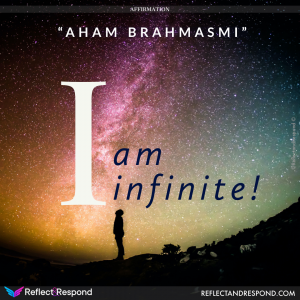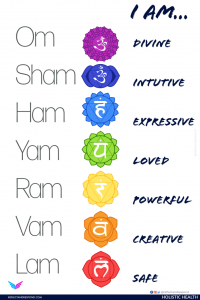Quotes from Upanishads
Powerful quotes from ancient Upanishads
“Aham Brahmasmi” – I am Infinite, I am divine
“That immortal Brahman alone is before, that Brahman is behind, that Brahman is to the right and left. Brahman alone pervades everything above and below; this universe is that supreme Brahman alone.: – Mundaka Upanishad
“By standing still we overtake those that are running”
– Katho Upanishad
As flowing rivers disappear into the sea, losing their names and forms, so a wise man, freed from name and form, attains the Purusha, who is greater than the great. – Mundaka Upanishad
“Health is a light body, freedom from cravings.
A glowing skin, sonorous voice, fragrance of body:
these signs indicate progress in the practice of meditation”
– The Upanishads

Health is a light body, freedom from cravings…
Health is more than an absence of disease. Stay fit physically, Calm mentally, and nourish your.
Meditate to let go – of what is not needed; Make room the room for next breath. Create room by fully letting go of the last breath.

By standing still we overtake those that are running
Let’s look at Stress & Anxiety, what it is and what can we do about it. Anxiety can be defined as our body’s response to stress. It is a feeling of fear or apprehension about future – what going to happen? Fear is a dominant emotion of our mind, ingrained in us from thousands of years of evolution. It was useful then to always be

Affirmation: I am Infinite
An affirmation from ancient text Upanishads, “Aham Brahmasmi” to remind you, that You Are Infinite! It will change your mindset, your life, your outlook. You will feel Joy, Happy, be Successful. Believe, Affirm & Repeat: “I am Infinite” Affirmation You can change your thoughts by repeating Affirmations and with a simple meditation practice. 1. REFLECT: Close your eyes, take a deep breath and invite a

May we learn to be like a river… Mundaka Upanishad
We hold onto many things that we don’t need. Physical objects and Events. May you flow like a river….
The Upanishads: उपनिषद् Upaniṣad are late Vedic Sanskrit texts of religious teaching and ideas still revered in Hinduism. They are the most recent part of the oldest scriptures of Hinduism, the Vedas, that deal with meditation, philosophy, and ontological knowledge;
Upanishad literal meaning is, “sitting close to” a spiritual teacher or a Guru.
Among the most important literature in the history of Indian religions and culture, the Upanishads played an important role in the development of spiritual ideas in ancient India, marking a transition from Vedic ritualism to new ideas and institutions.
Of all Vedic literature, the Upanishads alone are widely known, and their central ideas are at the spiritual core of Hinduism.
The Upanishads are commonly referred to as Vedānta. Vedanta has been interpreted as the “last chapters, parts of the Veda” and alternatively as “object, the highest purpose of the Veda”
Around 108 Upanishads are known, of which the first dozen or so are the oldest and most important and are referred to as the principal or main (mukhya) Upanishads.
“This syllable Om is indeed Brahman. This syllable is the highest.
Whosoever knows this syllable obtains all that he desires.”– Katha Upanishad
“Om is the bow; the Atman is the arrow; Brahman is said to be the mark. it is to be struck by an undistracted mind. then the atman becomes one with Brahman, as the arrow with the target.” – Mundaka Upanishad
“The knowing self is not born; it does not die.
it has not sprung from anything; nothing has sprung from it. birthless,
eternal, everlasting and ancient, it is not killed when the body is killed.”
–Katha Upanishad
“It is indeed the mind that is the cause of men’s bondage and liberation. the mind that is attached to sense-objects leads to bondage, while dissociated from sense-objects it tends to lead to liberation.” – Amrita-bindu Upanishad
“The wise man beholds all beings in the self and the self in all
beings; for that reason, he does not hate anyone.”– Isha Upanishad
“The self that is subtler than the subtle and greater than the great is seated in the heart of every creature. one who is free from desire sees the glory of the self through the tranquillity of the mind and senses and becomes absolved from grief.” – Katha Upanishad
“This Atman, resplendent and pure, whom the sinless sannyasins behold residing within the body, is attained by the unceasing practice of truthfulness, austerity, right knowledge, and continence.”
– Mundaka Upanishad
“To the seer, all things have verily become the Self: what delusion, what sorrow, can there be for him who beholds that oneness?” – Isha Upanishad
“Dissolves the self in the supreme self as the pot-space is dissolved in infinite space; then, as the infinite be silent forever, o sage!”
– Adhyatma Upanishad
“Knowing that great and all-pervading self by which one sees (the objects) both in the sleep and the waking states, the intelligent man grieves no more.” – Katha Upanishad
“Liberated from the grip of egoism, like the moon (after the eclipse), full, ever blissful, self-luminous, one attains one’s essence.”
– Adhyatma Upanishad
“Fools, dwelling in darkness, but wise in their own conceit and puffed up with vain scholarship, wander about, being afflicted by many ills, like blind men led by the blind.” – Mundaka Upanishad
“He who perceives all beings in the self alone, and the self in all beings, does not entertain any hatred on account of that perception.”
– Ishavasya Upanishad
“That which is consciousness alone which is all-pervading, which is eternal, which is all-full, which is of the form of bliss and which is indestructible, is the only true brahman (infinite consciousness).” – Varaha Upanishad
“Bondage is the imagination prompted by the desire for the eight powers.”
– Niralamba Upanishad
“Whether the body perishes now or lasts the age of moon and stars, what matters it to me having consciousness alone as my body? what matters it to the sky in the pot, whether it (the pot) is destroyed now or exists for a long time.” – Varaha Upanishad
“Like the butter hidden in milk, the pure consciousness resides in every being. that ought to be constantly churned out by the churning rod of the mind.”
– Amrita-bindu Upanishad
“Man is bound by ‘mine’, but he is released by ‘not mine’. he should abandon all the thoughts relating to externals and so also with references to internals. o ribhu, having given up all thoughts, you should rest content (in your soul) ever.” – Varaha Upanishad
“In order to realize the self, renounce everything. having cast off all (objects), assimilate yourself to that which remains.”
– Annapurna Upanishad
“Being first in a state of changelessness and then thoroughly forgetting (even) that state owing to the cognition of the (true) nature of Brahman (infinite consciousness) – this is called samadhi.” – Tejo-bindu Upanishad
“When all longings that are in the heart vanish, then a mortal becomes immortal and attains Brahman (infinite consciousness) here.”
– Katha Upanishad
“Those who are clever in arguments about Brahman, but are without the action pertaining to Brahman (infinite consciousness) and who are greatly attached to the world – those certainly are born again and again (in this world) through their ajnana (ignorance).” – Tejo-bindu Upanishad
“Arise! awake! approach the great and learn. like the sharp edge of a razor is that path, so the wise say—hard to tread and difficult to cross.”
– Katha Upanishad
“As rivers, flowing down, become indistinguishable on reaching the sea by giving up their names and forms, so also the illumined soul, having become freed from name and form, reaches the self-effulgent supreme self “– Mundaka Upanishad.
“That which cannot be expressed by speech, but by which speech is expressed. that alone know as Brahman and not that which people here worship.”
– Kena Upanishad
That which cannot be apprehended by the mind, but by which, they say, the mind is apprehended. that alone know as Brahman and not that which people here worship” – Kena Upanishad
That which cannot be perceived by the eye, but by which the eye is perceived. that alone know as Brahman and not that which people here worship”
– Kena Upanishad
“Children, immersed in ignorance in various ways, flatter themselves, saying: we have accomplished life’s purpose. because these performers of karma do not know the truth owing to their attachment, they fall from heaven, misery— stricken, when the fruit of their work is exhausted.” – Mundaka Upanishad



